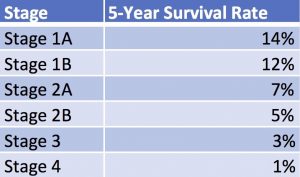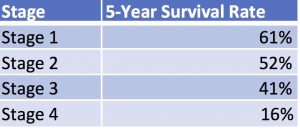Learning about pancreatic cancer survival rate helps a cancer patient better understand how likely it is that their treatment will be successful. Survival rates do not tell the whole story and do not determine how long a particular cancer patient will live for. By observing the 5-year pancreatic cancer survival rates, you will be looking at data that was captured within a 5-year range. Moreover, treatments now may have a better outlook than these numbers portray, since treatments are improving. These statistics observe cases of when the cancer was first diagnosed and does not record instances that the cancer reoccurred. According to the American Cancer Society, “The 5-year relative survival rates are estimates – your outlook can vary based on a number of factors specific to you.”
Do you need to ask an Oncologist basic questions? Speak to one today!
Exocrine Pancreatic Cancer Survival Rate
According to the American Cancer Society, people (in general) who can be treated with surgery tend to live longer than those who cannot be treated by surgery. Moreover, “The numbers below come from the National Cancer Data Base and are based on people diagnosed with exocrine pancreatic cancer between 1992 and 1998” (American Cancer Society).
The 5-year stage IA pancreatic cancer survival rate is 14% and 12% for stage IB. The 5-year stage IIA pancreatic cancer survival rate is 7% and 5% for stage IIB. The 5-year stage III pancreatic cancer survival rate is 3%. The 5-year stage IV pancreatic cancer survival rate is 1%.

Do you need to ask an Oncologist basic questions? Speak to one today!
Neuroendocrine Pancreatic Tumors Survival Rate
These pancreatic cancer survival rates only apply to people that have been treated by surgery. Moreover, “These numbers come from the National Cancer Data Base and are based on patients diagnosed between 1985 and 2004” (American Cancer Society).
The 5-year pancreatic cancer rate for stage 1 pancreatic NETs is 61%. The 5-year pancreatic cancer survival rate for stage II pancreatic NETs is 52%. The 5-year pancreatic cancer survival rate for stage III pancreatic NETs is 41%. The 5-year pancreatic cancer survival rate for stage IV pancreatic NETs is 16%. Furthermore, “In this database, the overall 5-year survival rate for people who did not have their tumors removed by surgery was 16%” (American Cancer Society).

Remember, there are still options for people that are in progressed cancer stages. Every day new treatments are coming out and options are increasing. Navigational services, like Oncologic Advisors, can help patients decide on which treatment is best for their cancer type and stage. Moreover, “There is increasing evidence that the best pancreatic cancer outcomes are achieved at major medical centers with extensive experience” (Hirshberg Foundation). By connecting you to the top treatment centers and doctors, Oncologic Advisors helps ensure you are increasing your chances for survival.
An Oncologist can help you answer basic questions, Have a 30 min consultation with one today for only $125 – no insurance needed! Schedule yours today.
References
Written by Kimberly HollandMedically Reviewed by. (n.d.). Pancreatic Cancer: Prognosis & Life
Expectancy. Retrieved March 04, 2017, from http://www.healthline.com/health/pancreatic-cancer/prognosis-life-expectancy#Outlook4
Pancreatic Cancer Survival Rates, by Stage. (n.d.). Retrieved March 04, 2017, from https://www.cancer.org/cancer/pancreatic-cancer/detection-diagnosis-staging/survival-rates.html
Prognosis. (n.d.). Retrieved March 04, 2017, from http://pancreatic.org/pancreatic-
cancer/about-the-pancreas/prognosis/

